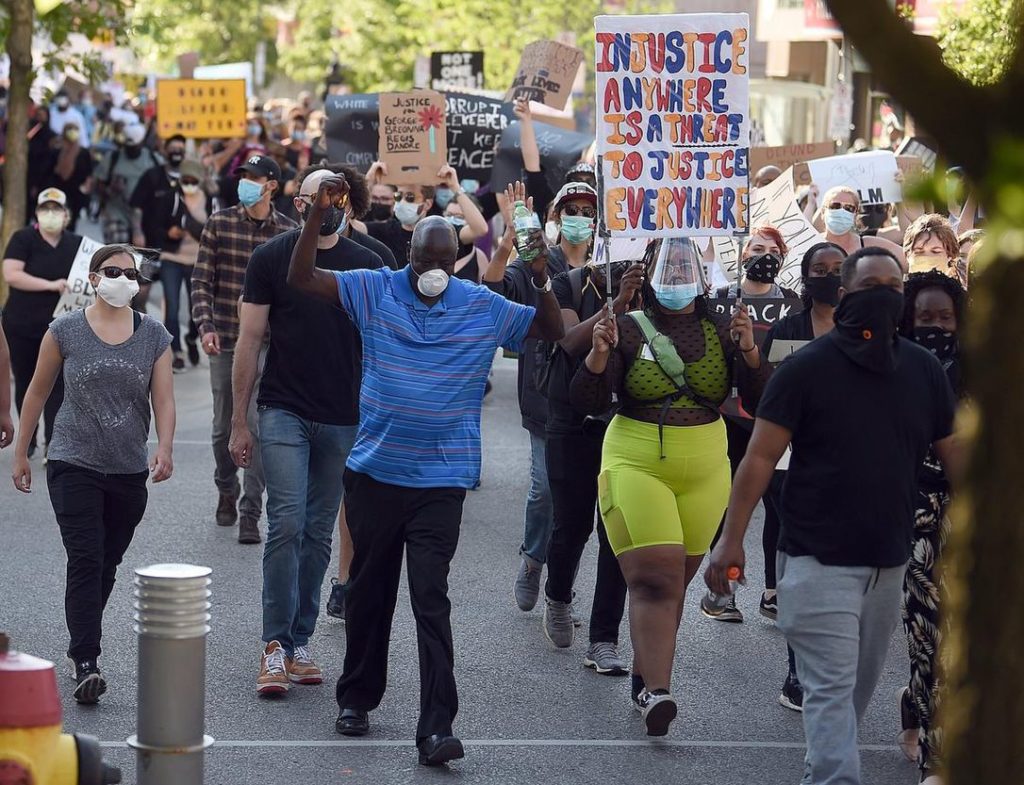
Waterloo Region’s history of anti-Black racism has come to light
By Victoria Rodney
Wed., July 8, 2020
In many ways, Waterloo Region is ahead of the curve with respect to its approaches to public health, multiculturalism and even to the refugee crisis. However, there’s an underbelly to this seemingly progressive, innovative culture.
In light of the global wave of the Black Lives Matter movement, the widely attended Kitchener-Waterloo solidarity march and the massive outcry for the defunding of police, some of Waterloo’s own dark history with anti-Black racism has come to light.
From the systemic to the interpersonal, anti-Black racism is prevalent within the Region of Waterloo. In 2017, Kitchener-Waterloo ranked third highest in the nation for rates of reported hate crimes per 100,000 people, according to Statistics Canada, and still remains one of the highest metropolitan areas with a disproportionate amount random police stops of visible minorities.
Marcia Smellie, a longtime resident and active community member, gave a resounding indictment of racism in the region. Her work here has been expansive, with anti-racist efforts documented at the provincial level — where she developed curricula to support the Human Rights Code — in the Waterloo Region District School Board and in the community with the local chapter of the Congress of Black Women.
In her work with students, Smellie remembers her work being largely successful, with young people easily able to grasp and apply equity. The true test was dismantling anti-Black racism in the community.
During her tenure as an organizer, a young Black man, 20-year-old Howard Joel Munroe, was murdered by a gang of white men, then known as the Slingers, in Victoria Park. This happened in 2001 and it took five years for Munroe’s murderers to be sentenced for his murder.
In a chilling recreation of events, a young, disabled Sudanese man, Francis Pitia, was brutalized at Victoria Park five years later. The assailant used Pitia’s crutch to bludgeon him in the attack.
The response of any resident would be to inform the police. However, in Smellie’s words, the police were little effective in protecting the Black community from harm, and are yet to be accountable for the harm. For Black people in the region, not only are they actively targeted, they are actively vilified in an attempt to convince us that Black people are deserving of surveillance, antagonism and violence.
While it may be enticing to assume the responsibility for racism singularly lies within institutional bodies such as the police, anti-Black racism’s reach extends far beyond that. If there’s one thing about anti-Blackness, it is powerful in its ability to manifest just about anywhere.
It’s not just police that have a disappointing history of anti-Black racism, The Record, like many mainstream media news sources, is complicit in criminalizing Black people through its filtered news coverage.
“Any time a young Black person would commit a crime, they would end up on the front page. Even if they weren’t from Waterloo,” Smellie says.
While Smellie’s experiences with anti-Black racism in the region might prompt readers to view this problem as an issue of the past, on June 23 flyers spewing anti-Black hate speech were delivered to people’s mailboxes in Kitchener and Waterloo.
In my own interactions as a student in the region, I’ve witnessed and have had to address anti-Black racism while also being victimized by it. Whether it be by members of senior administration, professors in my classroom or fellow academics that I am to call my peers, anti-Blackness has a way of consistently rearing its ugly head.
In my role as a student active in the community, many of my friends have reported being called the N-word, or being harassed on the way home, simply for just walking down the street. The experience with anti-Blackness is recreated at every level, everywhere. For many of us, there is nowhere to hide.
While these are more overt examples of anti-Blackness in the region, much more can be said about the covert manifestations, including racist hiring practices — about 90 per cent of Kitchener’s public service is white — widespread tokenism (where Black, Indigenous and people of colour are invited to the proverbial table and ignored or shut out from actually making meaningful change) and the intimidation and silencing of Black and Indigenous people when they vocalize their experiences with racism.
In experiencing this wave of reckoning, now is the time to ask: how can we ensure that things are actually different? How can we prioritize and reimagine the lives and livelihoods of Black and Indigenous people? The answer is to listen.
Victoria Rodney is an undergraduate student at the University of Waterloo writing, living and building community in Waterloo Region.
Source: The Waterloo Record

